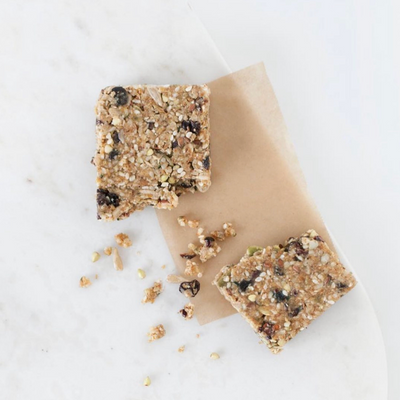Why You Should Eat Nuts and Seeds Every Day
13th Aug 2025
What Are Nuts and Seeds, Really
Nuts and seeds may be small, but they’re some of the most complete, naturally occurring foods on the planet. In nature, their job is to fuel a plant or tree’s life cycle, so it makes sense that they’re packed with everything you need to grow, repair, and energize your body.
Nuts typically come from the seeds of fruits (like almonds from the almond fruit or walnuts from a walnut tree). Seeds are simply the raw beginnings of a plant, such as chia, pumpkin, flax, or sunflower.
What makes them unique is their natural balance of healthy fats, protein, fiber, and antioxidants, which makes them more than just a snack. They’re functional foods. That means your body uses them right away for energy, healing, and hormone balance.
You’ll often see them tossed into trail mix or sprinkled on salads, but they deserve much more credit. They’re not just “extras,” they’re foundational. Why not live deliciously?
What Nurturance Do They Contain
Nuts and seeds are rich in:
- Fiber
- Healthy Fats
- Plant protein
- Micronutrients
- Iron
- B Vitamins
- Vitamin E
- Zinc
- Magnesium
They are basically nature’s multivitamin
Health Benefits Backed By Research
Nuts and seeds aren’t just a healthy snack; they are also associated with better long-term health outcomes across the board. Adding just a small daily serving has been linked to:
Heart Health
- Rich in unsaturated fats (especially omega-3s), they help reduce LDL (“bad”) cholesterol while raising HDL (“good”) cholesterol.
- Nuts contain arginine, an amino acid that supports blood vessel health.
- Regular consumption (especially almonds and walnuts(try our Cranberry Almond Lucuma Bar!)) has been shown to reduce the risk of heart attack and stroke.
Gut & Digestive Support
- The fiber in nuts and seeds acts as a prebiotic, feeding the good bacteria in your gut.
- Better gut health leads to stronger immunity, better mood, and less bloating.
Brain Function & Mental Clarity
- Walnuts, flaxseeds, and chia seeds are high in ALA, a plant-based omega-3 that supports memory and learning.
- Seeds are often high in magnesium and B vitamins, which play a role in calming the nervous system and preventing brain fog.
Stable Blood Sugar & Type 2 Diabetes Prevention
- The healthy fats and fiber in nuts and seeds slow down digestion, leading to more stable blood sugar levels.
- Studies show people who eat nuts regularly are less likely to develop insulin resistance or Type 2 diabetes.
Anti-Inflammatory Effects
- Many nuts and seeds are rich in antioxidants like vitamin E and selenium, which help fight free radicals.
- Chronic inflammation is linked to nearly every major disease (from arthritis to Alzheimer’s), and these nutrients help calm that response.
Better Blood Pressure
- Magnesium, potassium, and healthy fats help regulate blood pressure by supporting blood vessel elasticity and reducing inflammation in artery walls.
Cancer Risk Reduction
- Flaxseeds and sesame seeds contain lignans, compounds that have been shown to offer protective effects against hormone-related cancers, such as breast and prostate.
- The antioxidant content of seeds and nuts helps reduce cellular damage, which lowers long-term risk.
Mood & Mental Health
- Omega-3s, zinc, selenium, and magnesium are all linked to lower rates of depression and anxiety.
- Pumpkin seeds, in particular, are a good source of tryptophan, a precursor to serotonin.
How Much Should You Eat
The ideal amount to eat daily is about 1-2 ounces of nuts or 1-2 tablespoons of seeds. This is about a small handful. It really doesn’t take much; a little really goes a long way. Variety is key. Try rotating different types to get a range of nutrients. Elemental bars are a great way to do this!
Pantry Options
Nuts
- Almonds – great source of vitamin E and magnesium
- Walnuts – rich in omega-3s for heart and brain health
- Cashews – creamy, full of iron and zinc
- Pistachios – high in antioxidants and plant-based protein
- Brazil nuts – packed with selenium (just 1–2 a day is plenty) Elemental averages about 1-1.5 Brazil nuts per bar
Seeds
- Pumpkin seeds (pepitas) – high in zinc and iron
- Sunflower seeds – full of vitamin E and healthy fats
- Chia seeds – loaded with omega-3s and fiber
- Flaxseeds – great for digestion and hormone support
- Hemp seeds – high in protein and essential fatty acids
Easy and Fun Way to Eat Them
It doesn't have to be just eating a handful of nuts every day. There are so many fun ways to incorporate them into your meals. You can blend them into smoothies, sprinkle them on your yogurt and oatmeal, toss them on top of roasted veggies or a salad, or bake them into your baked goods.
And of course, they’re already perfectly portioned and deliciously paired in many of our bars! Try the Cranberry Almond, Dark Chocolate Peanut Butter, or Mulberry Spirulina for a tasty, functional way to get your daily dose.
Why We Use Them
Here at Elemental, nuts and seeds are the foundation of our bars. We love their functional benefits, flavor, and texture. From almonds and cashews to pumpkin seeds and sunflower seeds, they’re doing double duty: giving you something delicious and supporting your health in a tangible way.
The Bottom Line
Eating nuts and seeds daily is one of the simplest, most powerful things you can do for your body every day. Just a handful a day gives you energy, keeps you full, and supports nearly every system in your body.
So sprinkle, scoop, spread… or unwrap a bar.
Your body (and taste buds) will thank you.

